Living with the Alien: What it's like to spend a day with Alien: Isolation
It's impressed at press events, but is Alien: Isolation's long-game just as spectacular?
Alien: Isolation has impressed every time we've seen it since its reveal, but this time it's different. This isn't some staged demo, or bustling press event. This is me, one my own, with a build of Alien: Isolation. The lights are off. The headphones are on. I'm entirely alone. And, yes, I'm bricking it.
Alien: Isolation is so scary that it almost feels redundant to say it. This is a game that is built from the ground up on a foundation of panic and terror. It doesn't try to modulate its experience with anything else. In an age when blockbuster games want to be all things to all people, there's a vicious brilliance in the way Creative Assembly has decided that Alien: Isolation will just be the game that scares the shit out of you. That's all it does. It's all it needs to do.
The game starts with Amanda Ripley, daughter of Sigourney Weaver's movie character, arriving at the space station Sevastopol. Immediately, you're confronted with the realisation that things have gone horrifically pear-shaped. The lights are out, there's trash and debris all over the place and someone has written "TRUST NO ONE" in big red letters on the wall. There's also a woman bleeding to death on the floor, and a man begging you to go and find help in the station's medical section.
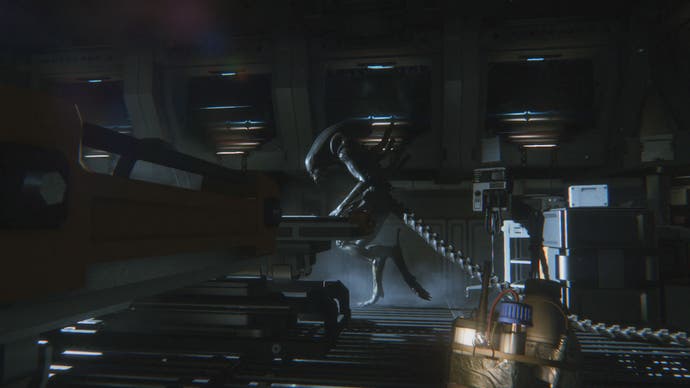
With that, you're off into the dark steaming bowels of the Sevastopol. The objectives you're given are really little more than basic fetch quests - go to this room, collect one of these, find this keycard - but this is a game where the journey is way more important than the destination. Areas that could be traversed in seconds in another game become nerve-wracking gauntlets here, thanks to that solitary Alien prowling around.
You encounter the beast early on, in one of only a few scripted moments. You've obtained a passcode from a terminal and are heading back to use it to unlock an elevator when there's a stomach-churning musical sting, a blast of steam and the clatter of a vent falling from the ceiling. Out it comes, tail first, unfurling like some unholy kite string, then the creature itself, a thing of terrible beauty, like a scorpion crossed with a panther.
I'm not ashamed to say that my first instinct was to dash back into the room I'd just come out of and hide in a cupboard. The noise, of course, attracts the Alien which clicks and snarls as it prowls the room while I watch through the slits in the door. It comes closer, and screen prompts tell me to use the left stick to pull away from the door and the left trigger to hold my breath. I fumble this basic task completely, the Alien rips the door open and slams its mandibles into my face.
Finding the game's rhythm takes some time. It's a game that delights in spooking you, using its superb sound design to keep you on edge. The station creaks and groans, computers bloop and crackle, but you soon learn to filter out the noises that spell danger. Heavy padding footsteps, the unmistakable crumpled metallic rumble of something moving in the vents above, the guttural hiss too malevolent for any steam pipe. You'll hear these noises, whip out that motion tracker and quickly, quietly, look for the nearest hiding place. If you're lucky, there'll be a locker nearby. If not, you'll just have to crouch, crawl under a desk, and try not to whimper as that iconic black shape coils past.
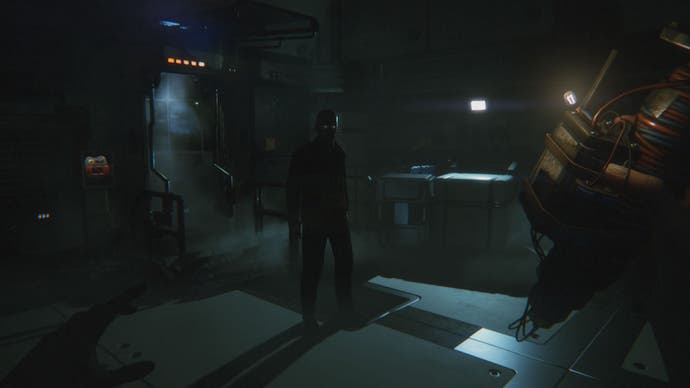
This at least gives you plenty of time to appreciate the attention to detail that has gone into the Sevastopol. The scuffed utilitarian look of Ridley Scott's movie is perfectly evoked. This is the future as seen from the 1970s, all moulded plastic and round corners. Chintzy public service posters remind station inhabitants to keep hydrated or, in a cute nod to Alien 3, to check for headlice. Screen displays are chunky, data is stored on big plastic cartridges and magnetic tape, and the station's systems - which you can reassign to help you along - boot up with the horizontal bars and data screech of a ZX Spectrum. Purely as an aesthetic work, Alien: Isolation is thoroughly impressive.
Story is doled out sparingly, thank goodness. There are few overt cutscenes, with dialogue mostly handled in the Half Life 2 style - delivered in-game, while you do other things. Contrary to my concerns, there aren't really that many other characters to get in the way. The vast majority of the game is spent with Ripley crawling around on her own, as the title promises. And while "Working Joe" synthetics are used to add an extra hazard, it never becomes an action game. You may have a pistol, but ammo is ridiculously sparse (after hours of play I only had 9 bullets to play with) and since loud noises are a great way to attract the Alien, it's not something you'll do unless you have literally no other option. The creature hovers over everything you do, forcing you to consider every action and movement in terms of how likely it is to bring slimy, snapping death down on your back.
In broader gameplay terms, however, the game feels harder to gauge. During my time with the game, the unscripted nature of the Alien proved both liberating and problematic. The knowledge that it could appear at any time makes for some unique and memorable excursions through Sevastopol's painstakingly realised world, but also leads to a fair amount of trial and error. Or, in some cases, not even trial and error, since there's no guarantee that events will play out the same way twice. It took me several attempts to reach certain objectives, and while plenty of my failures can definitely be blamed on my own mistakes, there were others where it felt like I really had no chance.
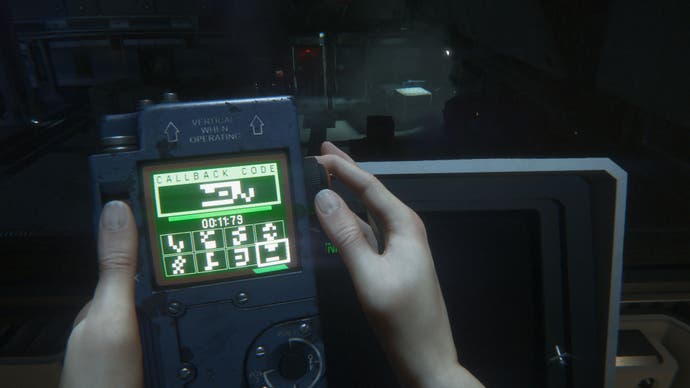
As such, Alien: Isolation has chosen to walk a very delicate tightrope. The ruthless difficulty is essential in creating a sense of genuine peril (indeed, this build is set to Hard mode by default) but it also means I repeated the same sections many times, and repetition soon becomes the antidote to fear. Certainly in the opening sections of the game, the Alien is a near constant presence, or at least it was during my play sessions. During particularly tricky sections, the monster sometimes felt less like an ominous threat, a Damoclean sword that could fall at any time, and more like a persistent nuisance to be worked around. The power of the creature - indeed of any movie monster - is the anticipation of its arrival rather than its actual presence, and sometimes Isolation's unscripted nature trips over that balance.
This doesn't mean I didn't enjoy my time in Alien: Isolation's cruel, sharp-edged world. In many ways, that zig-zag between terrified elation and controller-gripping frustration are the natural outcomes of the game Isolation is trying to be. It would have been easy for Creative Assembly to make it a cinematic adventure in which the player's progress is greased ever onwards through scripted set pieces, with quick restarts and forgiving difficulty. The theme park ride approach, in other words, where the importance of the "experience" trumps the gameplay.
Isolation scuttles in the opposite direction, and for all its immersive world-building and emergent storytelling, is actually a very videogamey video game. It is, at its heart, an heir to the original source of all survival horror: Pac-Man. You're stuck in a maze with a monster that can only ever be avoided or temporarily stalled. The perspective is different, the visual style is completely opposite, but the core gameplay hook is the same: that primal pulse-pounding feeling of being relentlessly chased, hunted, stalked. It's just that the same systems that can make that sensation so utterly thrilling can also make it kind of frustrating when things don't go your way.
And, as I've learned many times to my bloody cost, in Alien: Isolation things don't always go your way. In my hours with the game, on my own, at my desk, in the dark, it managed to delight me with its fan-pleasing fidelity, scare the bejesus out of me with its all-or-nothing stealth horror and, yes, drive me up the wall with its punishing brutality and sporadic save points. It is both exactly the game I was hoping for, and something else entirely. Am I heading back now for another encounter with the beast? Most definitely.
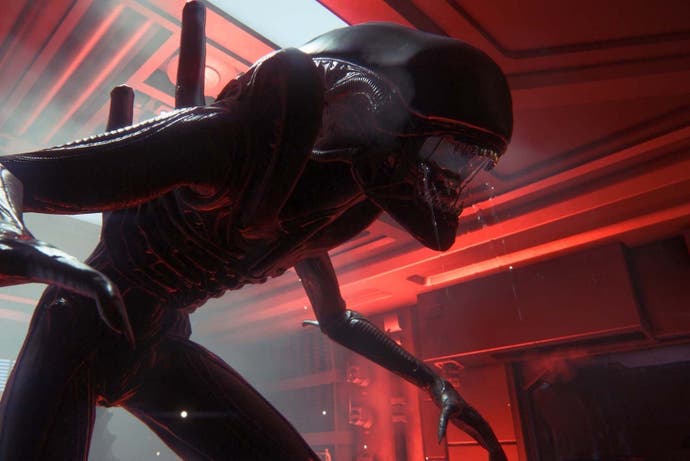



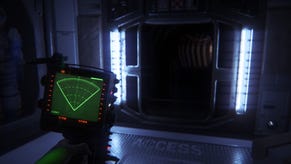

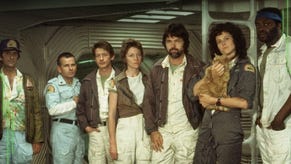

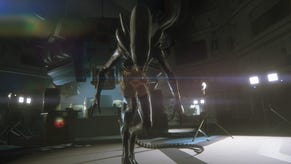




.png?width=291&height=164&fit=crop&quality=80&format=jpg&auto=webp)



